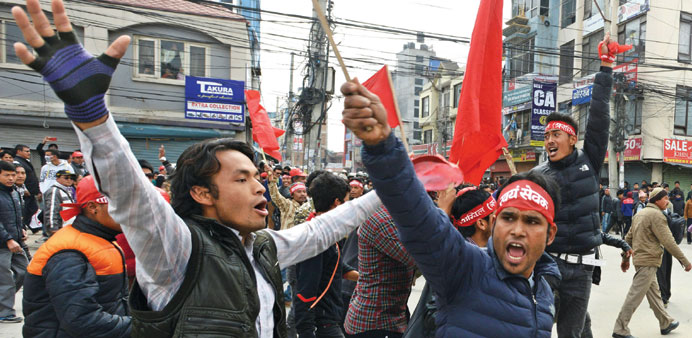Supporters of the 30-party alliance led by the Unified Communist Party of Nepal (Maoist) shouting slogans during mass demonstrations in Kathmandu yesterday.
AFP/Kathmandu
Nepalese police yesterday fired teargas and water cannon at thousands of opposition supporters who converged on the capital to protest controversial plans to vote on a disputed new national constitution.
As anger mounts over the planned vote, protesters threw bricks and stones in brief clashes with security forces who responded with about 20 rounds of teargas, police and an AFP reporter on the scene said.
“We estimate that around 35,000 people are participating in today’s rally,” Kathmandu police spokesman Dinesh Acharya said, while another officer said 4,000 police were lining the route through
Kathmandu.
Years of squabbling have seen Nepal’s politicians miss a series of deadlines to draft the charter which was designed to draw a line under a decade of civil war.
The government’s push last month to hold a vote, rather than seek agreement on disputed terms of the constitution, sparked protests including inside parliament itself, deepening discord between ruling parties and the opposition led by former Maoist rebels.
Yesterday, flag-waving demonstrators, riding motorcycles and travelling on foot, packed Kathmandu’s narrow streets and shouted slogans calling for a constitution based on
consensus.
An AFP reporter said the situation briefly turned violent when protesters tried to enter a restricted area near parliament and police moved in to disperse them.
Gopal KC, a doctor at Kathmandu’s Civil Service Hospital, said “24 people have been admitted here, all with minor injuries”. Police spokesman Acharya said that four officers were also wounded after protesters threw stones at them.
As thousands poured into an open meeting ground in the heart of Kathmandu, Maoist chief Pushpa Kamal Dahal addressed cheering supporters and said, “today’s demonstration clearly shows how
powerful we are”.
“Our strength should not be underestimated, otherwise the ruling parties should be prepared to face the upcoming challenge,” he said, warning of fresh protests unless lawmakers abandoned plans for a vote and returned to the negotiating table.
Man Bahadur Khadka, a 52-year-old farmer from eastern Nepal, took an overnight bus to the capital to join the rally and pressure lawmakers to draft a charter that is “friendly to the poor”.
“I don’t think the ruling parties should push through a constitution based on a majority vote,” Khadka said.
“They should realise that many sons of poor farmers lost their lives fighting for a better future for people like us,”
he said.
A key sticking point concerns internal borders, with the opposition pushing for provinces to be created along lines that could favour historically marginalised communities, handing them a majority and therefore more
influence in those areas.
Other parties have attacked this model, calling it too divisive and a threat to national unity.
No date has been set for the vote on the charter, which was intended to conclude a peace process begun in 2006 when Maoist guerrillas entered politics, ending an insurgency that left an
estimated 16,000 people dead.
But six prime ministers and two elections later, political infighting has confounded efforts to hammer out a deal, throwing parliament into disarray and crippling the economy of the impoverished Himalayan
nation.

